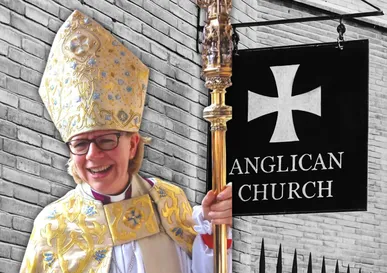
Is it still possible to be Anglican and evangelical?

Andy Lines
The appointment of Dame Sarah Mullally to one of the highest offices in the land has generated a huge amount of comment on different media platforms. As an Anglican leader myself, I’m going to try to briefly answer four questions that commonly arise.
- What message does the appointment of a theologically liberal woman as Archbishop of Canterbury send to the world and to the church?
For supporters, this shows that one of the last remaining “glass ceilings” for women in public life has been broken. A former senior nurse being the Archbishop now explicitly links the national Church of England, the kindness and care of the NHS, and the liberal values of the ruling establishment. Theologically orthodox churches around the world have received the message that their views have been ignored, even though this office is supposed to bring unity to a Communion of churches. The impact will go wider than this: how will the appointment be interpreted by powers with political, religious and commercial agendas around the world concerning the state of Britain today?
- Is it still possible to be Anglican and “evangelical” (in the sense understood by the founders and readers of en)?
The Thirty-Nine Articles, one of the key founding documents or “formularies” of the Anglican Church, locates the source of authority concerning knowledge of God as trinity, human sin, the gospel of salvation, the Christian life and the church in the Scriptures not in any church leader, office or institution. The Book of Common Prayer on which Anglican worship is based, is reformed and evangelical in its theology. Article 26 recognises that “sometimes the evil have chief authority in the Ministration of the Word and Sacraments”, but this does not invalidate “the grace of God’s gifts” which are received by faith regardless of the faithfulness or otherwise of the minister. Despite leadership by theologically compromised senior leaders especially in the Western world, there are many congregations in the Cof E where the word of God is faithfully preached and received, and millions of Anglicans around the world committed to “proclaiming Christ faithfully to the nations” (the GAFCON slogan of the 2018 Jerusalem conference).
- Can a faithful believer in England be a member of an Anglican church and yet not be associated with the leadership of the Archbishop of Canterbury?
The GAFCON Jerusalem Statement of 2008, of which the shorter, 14 point Declaration is a part, states clearly that the foundation of Anglicanism is doctrinal: “While acknowledging the nature of Canterbury as an historic see, we do not accept that Anglican identity is determined necessarily through recognition by the Archbishop of Canterbury.” This ground-breaking concept has been backed up with action. In parts of the world where governing bodies have led the “official” Canterbury-aligned denomination away from Bible-based faith, GAFCON, representing the majority of the world’s Anglicans, has stepped in to authorise a separate, orthodox Anglican jurisdiction. This means that, here in the UK and in continental Europe, there is a structure led by godly, Biblically faithful bishops, under which individuals can join existing congregations, congregations from other jurisdictions can join, and new churches can be planted. This is the Anglican Network in Europe (ANiE), and perhaps it needs to be stressed, our region of Europe includes Britain and Ireland!
- Why would any genuine Christian continue as an Anglican today?
Many Anglican evangelicals have reiterated their commitment to remain in the Church of England, in impaired communion with bishops, perhaps with the hope of reforming it in future, while taking advantage of opportunities for mission which remain at local level. Some question the integrity of this, and are leaving, feeling that Anglicanism itself is inherently compromised. ANiE holds out another option: retaining good aspects of Anglican church governance, Scripture-soaked liturgy and being part of an historic movement of a genuinely global fellowship, having completely broken ties with Canterbury.

Questions from a visit to North Africa

Andy Lines
I recently attended the consecration of Dr Ashley Null as Anglican bishop of North Africa, a new Diocese in the Province of Alexandria.
The service took place in Tunis, and I was among the leaders from around the world who represented the GAFCON movement. It’s estimated that there are around 30,000 Christians in Tunisia (0.2% of the total population) of whom some are Anglican (English, Arabic and Berber-speaking); there are also Anglican congregations able to meet openly in Chad, and groups of underground believers (including Anglicans) in Mauritania, Libya and Algeria.
Crosslinks: 90 years and counting

Andy Lines
October 27 marks the 90th anniversary of the launch of the Bible Churchmen’s Missionary Society (BCMS), now called Crosslinks.
This is a landmark shared with the FIEC. As we look back with thanks to God, it is also salutary to ponder the continuing need for such a society.
Is it still possible to be Anglican and evangelical?
The appointment of Dame Sarah Mullally to one of the highest offices in the land has generated a huge amount of comment on different media platforms. As an Anglican leader myself, I’m going to try to briefly answer four questions that commonly arise.
For supporters, this shows that one of the last remaining “glass ceilings” for women in public life has been broken. A former senior nurse being the Archbishop now explicitly links the national Church of England, the kindness and care of the NHS, and the liberal values of the ruling establishment. Theologically orthodox churches around the world have received the message that their views have been ignored, even though this office is supposed to bring unity to a Communion of churches. The impact will go wider than this: how will the appointment be interpreted by powers with political, religious and commercial agendas around the world concerning the state of Britain today?
The Thirty-Nine Articles, one of the key founding documents or “formularies” of the Anglican Church, locates the source of authority concerning knowledge of God as trinity, human sin, the gospel of salvation, the Christian life and the church in the Scriptures not in any church leader, office or institution. The Book of Common Prayer on which Anglican worship is based, is reformed and evangelical in its theology. Article 26 recognises that “sometimes the evil have chief authority in the Ministration of the Word and Sacraments”, but this does not invalidate “the grace of God’s gifts” which are received by faith regardless of the faithfulness or otherwise of the minister. Despite leadership by theologically compromised senior leaders especially in the Western world, there are many congregations in the Cof E where the word of God is faithfully preached and received, and millions of Anglicans around the world committed to “proclaiming Christ faithfully to the nations” (the GAFCON slogan of the 2018 Jerusalem conference).
The GAFCON Jerusalem Statement of 2008, of which the shorter, 14 point Declaration is a part, states clearly that the foundation of Anglicanism is doctrinal: “While acknowledging the nature of Canterbury as an historic see, we do not accept that Anglican identity is determined necessarily through recognition by the Archbishop of Canterbury.” This ground-breaking concept has been backed up with action. In parts of the world where governing bodies have led the “official” Canterbury-aligned denomination away from Bible-based faith, GAFCON, representing the majority of the world’s Anglicans, has stepped in to authorise a separate, orthodox Anglican jurisdiction. This means that, here in the UK and in continental Europe, there is a structure led by godly, Biblically faithful bishops, under which individuals can join existing congregations, congregations from other jurisdictions can join, and new churches can be planted. This is the Anglican Network in Europe (ANiE), and perhaps it needs to be stressed, our region of Europe includes Britain and Ireland!
Many Anglican evangelicals have reiterated their commitment to remain in the Church of England, in impaired communion with bishops, perhaps with the hope of reforming it in future, while taking advantage of opportunities for mission which remain at local level. Some question the integrity of this, and are leaving, feeling that Anglicanism itself is inherently compromised. ANiE holds out another option: retaining good aspects of Anglican church governance, Scripture-soaked liturgy and being part of an historic movement of a genuinely global fellowship, having completely broken ties with Canterbury.